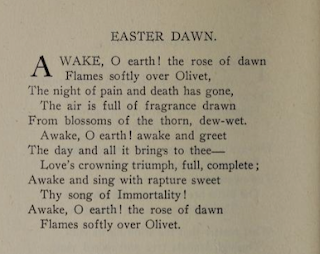He Will Return
Helen Dickson Reynolds
Toronto: Ryerson, 1959
Newly-minted art school graduate Constance Manning faces the challenge of making a living as a portrait painter in Depression-era Vancouver, as detailed on the second page of this, Helen Dickson Reynolds' twenty-third novel:
"You know, Ivor, this pretty little girl has just been given a diploma by the Vancouver Art School. I'm afraid you're going to find this city a poor market for pictures, Connie, and this Depression doesn't help."Pay no attention to crape hanger John and wife – this is their only scene – focus instead on Ivor. He of the title, Ivor Owen-Jones is a thin young Welshman with "jet -black hair brushed back from a good forehead, a well-shaped nose and sensitive, mobile mouth." This is the moment of their meeting... by which I mean the meeting of Constance and Ivor, not nose and mobile mouth.
"Don't be such a crape hanger [sic], John," his wife reproved. "Our new Art Gallery will give young artists a place to exhibit and sell their paintings."
"Oh sure,"the doctor agreed amiably. "We're a young city, you know, Ivor. It's only forty-six years since this town was completely wiped out by fire."
"Great Scott! It's inconceivable. The houses and gardens look so well established."
In the months that follow they play tennis in Stanley Park, swim at Second Beach, visit the Pauline Johnson Memorial and take in cricket matches at Brockton Point. One afternoon by rustic Lumberman's Arch Ivor says something about maybe one day visiting Wales together. For a reason I cannot fathom, Constance interprets this a marriage proposal. Ivor seems equally dumfounded, but goes with the flow just the same. In the second chapter the young couple marry and move into a small bungalow in North Vancouver.
Life isn't easy for the Owen-Joneses – this is the Depression, you'll remember. Ivor has an indescript office job with a firm called Western Imports, while Constance gives art lessons and receives the occasional commission to do a child's portrait. Things would be a whole lot easier if only the groom would make use of his God-given talents. Ivor has a voice like Devonshire cream and an extensive repertory of traditional Welsh songs. Fussy Shaughnessey matrons look to hire him to perform at their soirées – "a refreshing change from the usual ballads and arias" – but Ivor takes offence in not being permitted to mingle with the guests. "Honestly, it was like the Middle Ages, when musicians ranked with scullions," he tells his bride.
The pair live frugally, affording poor Constance precious few opportunities to don her trousseau dresses. Things go from bad to worse when Ivor is fired on the very day Constance announces that she is pregnant. Her father gets him another job, but the firm goes bust just after the baby is born. Constance becomes pregnant again, and Ivor struggles to make ends meet as a door-to-door washing machine salesman. Must've been hell on the back. When the couple fall behind on their bills, losing their electricity, Ivor decides to apply for public relief:
He stared at the window curtained with raindrops. "I'll wait till the mail comes. I've made applications to firms with box numbers... there may be something. Anyway, it's a filthy day."I could believe it. I'd been waiting for Great-aunt Gladys to kick off ever since Constance had sent the old girl sketches of her babies.
The postman came with letters held under his glistening raincoat. He shoved one legal-looking envelope through the slot in the door. Ivor snatched it up.
"It's from a legal firm in Wales." His fingers shook as he tore the stiff paper of the envelope. "My God, it's a will... Great-aunt Gladys has died... and left me a thousand pounds. I can't believe it."
Ivor races to the bank, leaving Constance in the dark with pencil stub and paper figuring out just how to make the inheritance stretch. He returns holding the deed to a farm outside Nelson. "I bought it at a tremendous bargain because the owner, quite an old man, has died recently, and the heirs want to wind up the estate."
Oh, dear.
The farm isn't quite as described. The Owen-Joneses manage to stave off poverty just long enough for Constance to give birth to a third child. When Great-aunt Gladys's money runs out, Ivor runs off, leaving behind a note promising that he'll return once he's found work. Constance carries on for several seasons, all the while expecting Ivor to walk through the door at any minute. If only he'd write. She eventually sells the farm, moves with her children back to Vancouver, and secures a position as an public school art teacher.
"The war years passed..." Yes, they did – and still no word from Ivor. Constance, cautious, manages to clothe and feed and her three children. No occasions now to dip into her trousseau. Straight-laced next-door neighbour Stephen Cochrane expresses interest, but is shot down: "Stephen, I am sorry, but I firmly believe that Ivor is alive and that in the course of time he will come back to me."
It was at this point I began to think Constance had become unhinged. After all, it had been more than eight years since Ivor had gone off in search of a job and he hadn't so much as sent a letter. In the fact of this, Constance's love and faith remain constant; she looks forward to the day he too will laugh at their children's antics.
Where once time crawled, then passed, it now flies. "Life went on fairly quietly until David's twenty-first birthday," begins the twenty-first chapter. What happens is this: David, her eldest, announces that he is going to marry a mousy pianist named Mona. The news brings on a dizzy spell. A few weeks later, daughter Faith earns a scholarship to study ballet in far off New York City. Another dizzy spell. Constance, who had demonstrated such fortitude in raising three young children, alone, is suddenly frail. When number two son Robert gets a job as pilot up north, Constance suddenly faces long evenings alone in a house that "echoes with emptiness." She fills her leisure time with visits to her elderly parents and taking shut-ins for drives. One particularly lonely night she decides to go to the cinema. There Constance takes in a bland feature, followed by a cartoon, followed by a travelogue in which she spots Ivor walking in Trafalgar Square.
You caught that, right? Ivor walking in Trafalgar Square? I nearly missed it myself because I'd pretty much given up on his return. After all, he disappeared in the first half of the novel and hadn't been heard from since. Oh, there were times I thought he might turn up, like in the odd, overly-detailed description of the VJ-Day crowd in chapter 18, but with just nine pages to go his reappearance was a real surprise.
On the next page, Constance manages to get a letter to her husband:
Come back and take care of me? When did Ivor ever take care of you, Constance? You were better off without him. That Welshman is a leach. The good folks at Western Imports will attest that he has absolutely no work ethic. Besides, what kind of husband buys a farm – sight unseen – without consulting his wife? For that matter, what kind of idiot buys a farm when he knows nothing about farming. For goodness sake, what kind of father refuses to sing for his baby's supper?
Ivor does indeed return. Before he does, "happy as a young bride," Constance shops for his favourite foods, a new tie and new socks. She picks him up at the airport. They embrace. All is forgiven. The next day they go off on what Constance describes as their "second honeymoon."
The ending is so very sudden and so very strange that I began to wonder whether it was all in Constance's head. Could it be that the omniscient narrator isn't? Might it be that this story is told by Constance herself? Is it all an abandoned wife's fantasy?
Nothing so interesting, I'm afraid. The sad truth is that He Will Return is just a very bad novel.
He will return? Sure, but only if you pay his way.
Note: Did not win the Ryerson Fiction Award.
Object: A 256-page novel in unattractive brown boards. The dust jacket illustration is by art school graduate Jon Nielsen. The back of the jacket takes the form of an advertisement for recent Ryerson titles by Will Bird, Ada Pierce Chambers, E.M. Granger Bennett, Gaie Taylor and Myron David Orr. Reynolds' previous novel, McBain's Brier Rose (1957), leads the list.
Access: Though the author's most common book, He Will Return is found in just fourteen of our university libraries. Library and Archives Canada doesn't have it, but the Calgary Public Library does.
The Canadian edition enjoyed one lone printing. The novel was published in the United States by Thomas Bouregy. Copies listed for sale online run between US$10 and US$30. I found mine six years ago at a London Goodwill. Price: $2.99.
Related post:




























































